Umuntu ngumuntu ngabantu (I am because you are). Happy Africa Day!
As we commemorate Africa Day on May 25th, a significant event that celebrates achievements and acknowledges current progress towards Agenda 2063, we are reminded of the essence of Ubuntu. This African philosophy underscores the power of collaboration and the value of collective effort and resonates deeply with the collaborative spirit of iPRIS.
AGENDA 2063 is Africa’s blueprint and master plan for transforming Africa into the global powerhouse of the future. It is the continent’s strategic framework that aims to deliver on its goal for inclusive and sustainable development and is a concrete manifestation of the pan-African drive for unity, self-determination, freedom, progress and collective prosperity
iPRIS aims to bridge the digital divide by enhancing digital connectivity across Sub-Saharan Africa and by creating opportunities for knowledge exchange amongst African countries and between the EU and Africa. Collaboration is the key to catalysing inclusive access and propelling digital opportunities to achieve prosperity and sustainability.
During the ongoing phase in Sweden, the second cohort of iPRIS, consisting of national regulators of Tanzania, Uganda, South Africa, Rwanda, Lesotho, Mauritius, and the Gambia, actively engaged in peer-to-peer learning sessions. This interactive platform facilitated the sharing of experiences with their fellow African and European counterparts and fostered a deeper understanding of the regulatory landscape in the telecommunications sector in Africa, Sweden (Swedish Post and Telecom Authority) and other countries in the European Union.
For the past two weeks now, in the true spirit of Ubuntu, the ICT regulators have been collaborating and boosting their technical abilities to shape and implement regulatory frameworks in the telecommunications sector in their respective countries.
The regulators have also evaluated their current country contexts and will work on change initiatives for the next 11 months. Change initiatives are strategic projects to bridge the digital divide by addressing challenges and opportunities within the ICT sector. They are the cornerstone of iPRIS and are specifically designed to align with the strategic agendas of regulatory bodies. The change initiatives focus on policy development and implementation linked to key issues within the ICT sector, such as infrastructure gaps, regulatory inefficiencies, or digital inclusion barriers
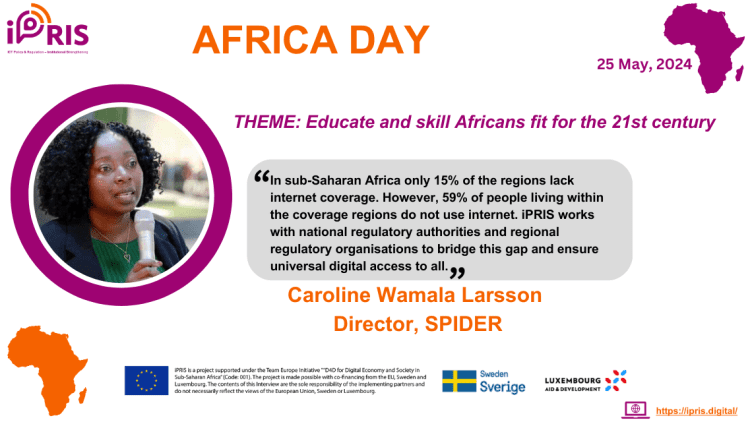
iPRIS targets 43 African countries to enhance inclusive digital connectivity and drive socioeconomic prosperity through Information and Communication Technology (ICT).
Dr. Caroline Wamala, Director of SPIDER, remarked, “iPRIS recognizes the crucial role of ICT policies and regulations in promoting digital inclusion, equitable internet access, consumer rights protection, and personal data safeguarding.”
The National Regulatory Authorities (NRAs) participating in the iPRIS 2024 May peer to peer training session in Sweden include:
- The Gambia’s Public Utilities Regulatory Authority (PURA)
- Lesotho Communications Authority (LCA)
- Mauritius’ Information and Communications Technology Authority (ICTA)
- Rwanda Utilities Regulatory Authority (RURA)
- Independent Communications Authority of South Africa (ICASA)
- Tanzania Communications Regulatory Authority (TCRA)
- Uganda Communications Commission (UCC)
- Swedish Post and Telecom Authority (PTS)
Spotlighting ICT Regulators on Africa Day
On Africa Day, iPRIS highlights the efforts of these national and regional ICT regulators in championing the importance of ICT for enhancing educational outcomes. Regional and national regulators from the 2023 A and 2024 A cohort share their insights on leveraging digital technologies to drive development, enhance connectivity, and foster digital inclusion across the 43 countries involved in iPRIS.
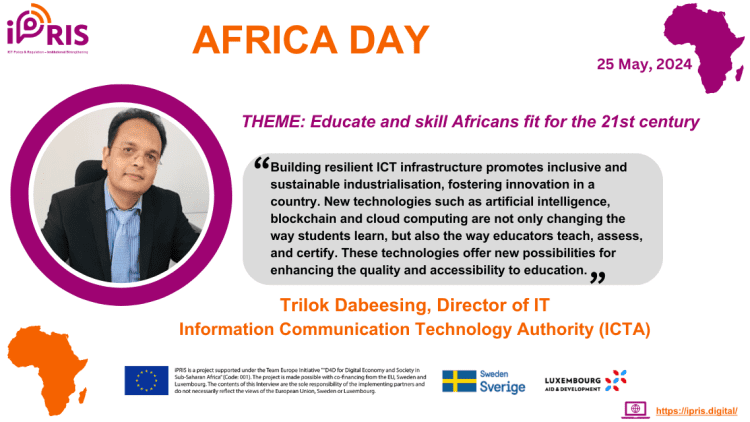
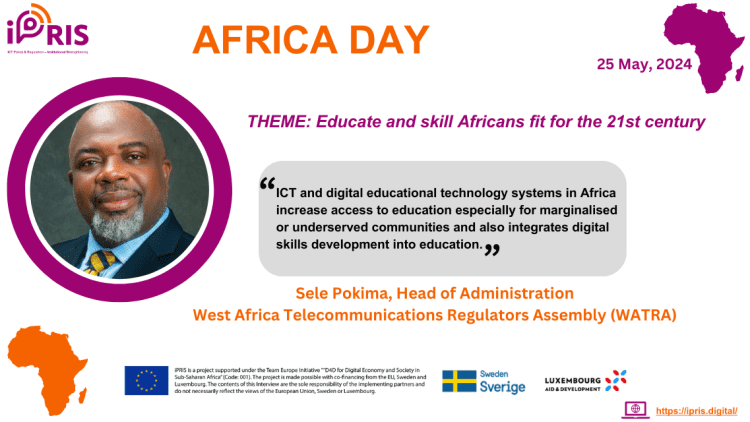
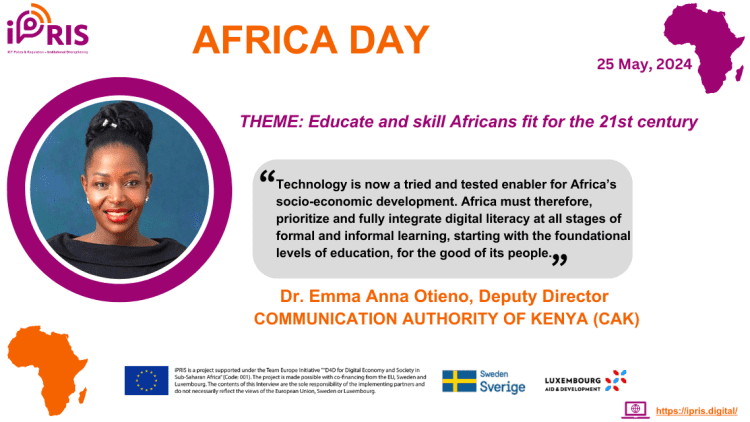
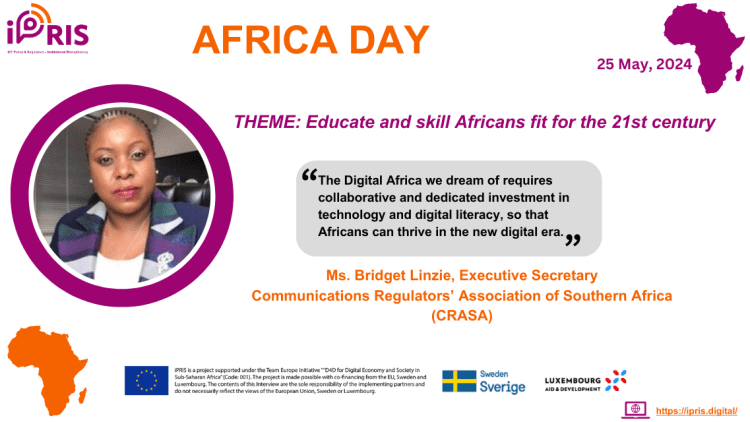
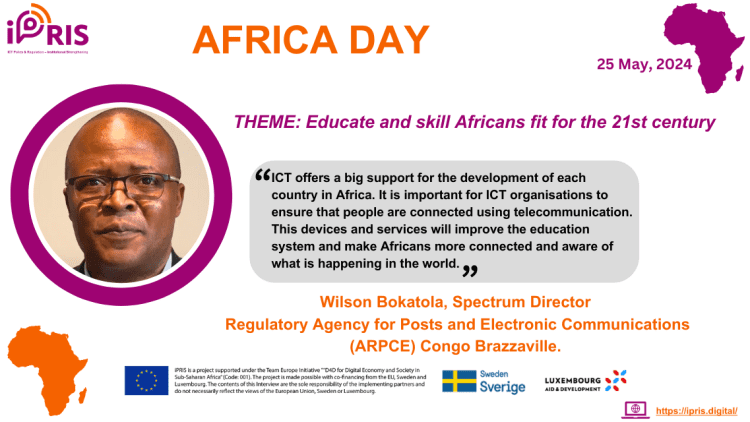
The Importance of Africa’s Digital Revolution
About 60 percent of the Africa continent population is below 25 years. Africa's has an opportunity to reap from the demographic divide and the digital evolution is recognized as a pivotal driver of socio-economic progress, creating employment opportunities, and improving overall well-being. The African Union (AU) emphasizes the transformative impact of digital technologies on the continent.African children and youth are at the forefront of this digital transformation. Access to quality education is fundamental for their development, and digital technologies provide opportunities to enhance the learning experience. However, educators need training, resources, and support to fully realise these benefits to integrate digital methods into their teaching. Schools must also have adequate resources and trained personnel to maintain and update technological equipment, ensuring its functionality and relevance. Empowering the learners with digital literacy skills is crucial to enable them to navigate an increasingly digitized world and participate meaningfully in the global economy.
Investments and policy interventions
Successfully navigating these challenges requires comprehensive policy interventions, significant investment in infrastructure, and robust capacity-building initiatives. By addressing these issues, Africa can harness the transformative power of digital technologies to advance education, promote inclusive development, and bridge the digital divide. As Africa celebrates its achievements and looks forward to future progress on Africa Day, the role of digital technologies in driving socio-economic development is more critical than ever. Initiatives like iPRIS exemplify the collaborative efforts needed to foster digital inclusion and connectivity across the continent, ensuring that all Africans can participate in and benefit from the digital revolution.
About iPRIS
ICT Policy & Regulation – Institutional Strengthening (iPRIS) contributes to bridging the digital divide by boosting the capacities of African telecommunications regulatory bodies. Engaging 43 countries in Africa, iPRIS aims to enhance inclusive digital connectivity and drive social and economic prosperity using ICT.
iPRIS provides peer-to-peer capacity-building for African National Regulatory Authorities and Regional Regulatory Organisations. It stems from the recognition of the significance of ICT policies and regulation in promoting digital inclusion, equitable access to the Internet, consumer rights protection, and personal data safeguarding.
The iPRIS project is implemented by SPIDER (the Swedish Program for ICT in Developing Regions ), The Swedish Post and Telecom Authority (PTS), and the Luxembourg Regulatory Institute (ILR). SPIDER coordinates the project and offers its expertise in the digital international development sector and in Diversity, Equity, and Inclusion (DEI). PTS is regulation content and policy lead for the project. ILR brings its expertise in European regulation and policy for the French speaking countries.
iPRIS is funded by the European Union, Sweden, and Luxembourg as part of the Team Europe Initiative “D4D for Digital Economy and Society in Sub-Saharan Africa” (Code: 001).





